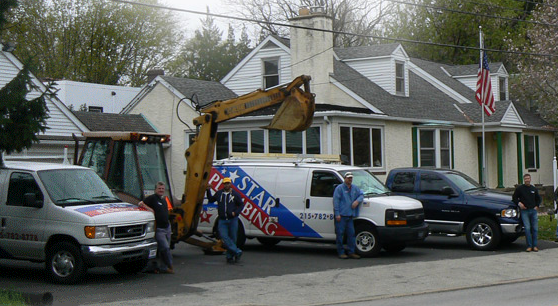What Is The Purpose Of Pipe Insulation? – Exploring Its Benefits
Pipe insulation is a material designed to improve the thermal efficiency of pipes. The purpose of pipe insulation is to reduce heat loss/gain and minimize condensation from forming on pipes, thereby increasing energy efficiency, protecting personnel from burns or scalding, and reducing sound transmission. Pipe insulation can also be used to prevent water freezing in cold climates and lower the risk of corrosion of the pipe itself. It is typically made from polyethylene foam or fibre glass and come in a variety of sizes, shapes and colours.
What Is The Purpose Of Pipe Insulation?
Pipe insulation is an important part of plumbing that helps to keep pipes from freezing and bursting during cold weather. It also serves to reduce noise, reduce energy loss, and increase heat retention. There are several types of pipe insulation that can be used for different applications.
Increase Heat Retention
The main purpose of pipe insulation is to help maintain a consistent temperature in the pipes so that they do not freeze or burst in cold weather. Insulating the pipes helps to keep the heat inside them and prevent it from escaping into the surrounding environment. This reduces energy loss and allows the pipes to retain heat, which helps them stay warm enough even in extreme cold temperatures.
Reduce Energy Loss
Insulating your pipes also reduces energy loss by helping to keep them cool during hot weather. Without insulation, pipes can become very hot and cause your heating system to work harder than necessary. Insulating your pipes keeps them cool, which in turn helps reduce energy costs associated with heating and cooling systems.
Reduce Heat Loss Through Conduction
Pipe insulation also helps reduce heat loss through conduction by preventing the transfer of heat from one area of the pipe to another. This helps maintain a more consistent temperature throughout the length of the pipe, which helps protect against freezing or bursting in cold weather conditions. Additionally, insulating your pipes can help protect against condensation buildup on interior walls or floors as well as mold and mildew growth due to humidity buildup inside the pipe.
Noise Reduction
Insulating your pipes can also help reduce noise levels in your home or business due to its soundproofing properties. It helps absorb sound waves generated by running water or other plumbing fixtures so that they are not as loud or disruptive in other rooms or areas of your home or business premises.
Different Types Of Pipe Insulation
Fiberglass is one of the most common types of insulation used for pipes because it is easy to install and it provides good thermal protection for both hot and cold temperatures. Other materials such as foam rubber, polyethylene foam, mineral wool, corkboard, and polyurethane foam can also be used for pipe insulation depending on your specific needs and budget considerations. Different materials have different levels of performance when it comes to thermal protection so it is important to choose one that meets all your requirements before installing it on your plumbing system
What Is The Purpose Of Pipe Insulation?
Pipe insulation is an essential component of any plumbing system. It serves to protect the piping from heat loss, condensation and freezing, as well as reducing noise from the pipes. It can also help reduce energy costs by keeping hot water warm and helping to regulate the temperature of cold water. Pipe insulation is available in a range of materials, including foam, mineral wool and expanded polystyrene. Selecting the right type of pipe insulation can be difficult, so it’s important to understand the different types and their advantages and disadvantages.
Types Of Pipe Insulation
Polyethylene foam insulation is one of the most common types of pipe insulation used in plumbing systems. It comes in pre-formed tubes that are easy to install, making them a popular choice for DIY projects. They are lightweight and have excellent thermal properties, making them an effective insulator for both hot and cold water pipes. Expanded polystyrene foam is another type of pipe insulation that is often used in commercial applications due to its durability and high efficiency ratings. It’s also less expensive than other types of insulation but may require more effort to install correctly. Mineral wool insulation is another option for insulating pipes, usually made from recycled glass or rock wool fibers. It has excellent soundproofing properties as well as good thermal performance, making it ideal for use in areas with high noise levels.
How To Select The Right Pipe Insulation?
Choosing the right type of pipe insulation depends on a number of factors such as climate, budget and installation requirements. The first step is to choose the appropriate thickness for your needs; this will depend on factors like where you live (cold climates require thicker insulation) and how much you intend to spend (thicker options tend to be more expensive). Once you’ve chosen a thickness, you can then decide which type of material best suits your needs; if soundproofing is important then mineral wool may be best whereas if cost is an issue then polyethylene foam may be preferable. Finally, take into account installation requirements; some materials such as mineral wool require special brackets or adhesive whereas others such as polyethylene foam are easier to install yourself with minimal tools or equipment.
FAQ & Answers
Q: What is the purpose of pipe insulation?
A: The main purpose of pipe insulation is to increase heat retention and reduce energy loss, as well as reduce heat loss through conduction and noise reduction.
Q: What are the different types of pipe insulation?
A: The different types of pipe insulation include fiberglass insulation, polyethylene foam insulation, expanded polystyrene foam, and mineral wool insulation.
Q: What factors should be considered when selecting the right pipe insulation?
A: When selecting the right pipe insulation, it is important to consider the thickness of the material needed. Depending on your application, you may need to choose a thicker or thinner material.
Q: Does using pipe insulation help with soundproofing?
A: Yes, using pipe insulation can help with soundproofing by reducing noise transmission through piping systems.
Q: Does using pipe insulation save energy?
A: Yes, using insulated piping helps to reduce energy loss in buildings by preventing heat from escaping through uninsulated pipes. This can help to lower energy bills over time.
In conclusion, the purpose of pipe insulation is to protect the pipes from extreme temperatures, prevent condensation, and reduce energy loss. Insulated pipes can help maintain water temperature and pressure levels, preventing fluctuations that can damage plumbing systems. Additionally, pipe insulation can reduce noise pollution in plumbing systems and help keep them efficient. Therefore, it is an essential part of any plumbing system.
Author Profile

-
Star Plumbing, located in Elkins Park, PA, is a full-service plumbing company owned and operated by Mitchell Gordon. Since its inception, Star Plumbing has been providing its customers with reliable, quality plumbing services.
The Star Plumbing website offers informative articles on DIY plumbing and plumbing equipment, offering readers helpful advice and tips on how to take care of their own plumbing needs. This is a great resource for those who are looking to tackle a plumbing project themselves, as it provides useful information and advice on how to safely and successfully complete a plumbing job. Additionally, the website provides detailed descriptions of the various plumbing tools and equipment that are available, as well as detailed instructions on how to use them.
Star Plumbing’s website is a great resource for anyone with plumbing needs. Whether a customer is looking for advice on how to take care of their own plumbing or to schedule service from Star Plumbing, the website offers helpful advice and information for all their plumbing needs.
Latest entries
- April 12, 2024Plumbing Equipment And AccesoriesI Tested And Ranked The Best 10 Inch Rough In Round Toilet: And Here’s What I Found
- April 12, 2024Plumbing Equipment And AccesoriesI Tested And Ranked The Best Stone That Cleans Toilets: And Here’s What I Found
- April 12, 2024Plumbing Equipment And AccesoriesI Tested And Ranked The Best Heat Tape For Plumbing: And Here’s What I Found
- April 12, 2024Plumbing Equipment And AccesoriesI Tested And Ranked The Best Kaboom Toilet Bowl Tablets: And Here’s What I Found
